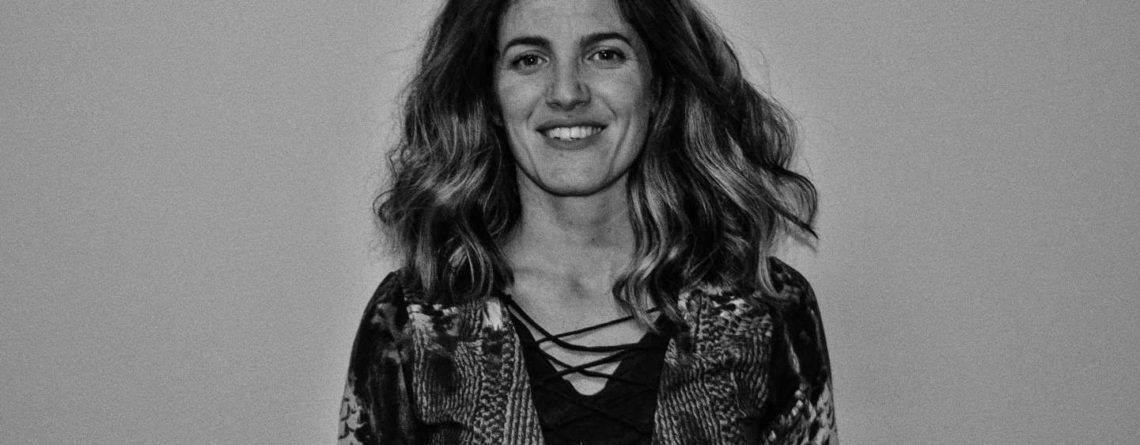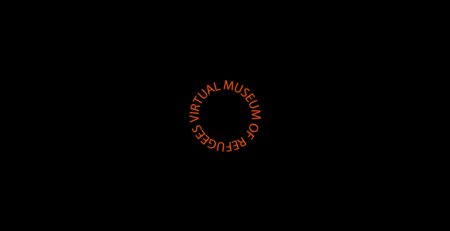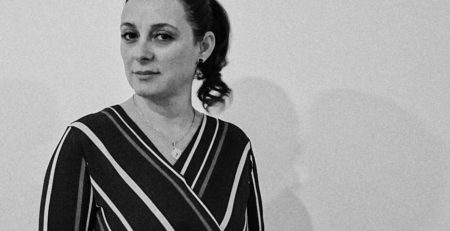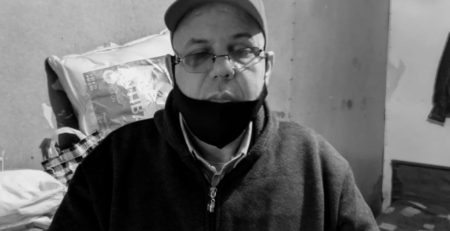Fjolla Dumani
Bjeshka Guri (interviewer)
Fjolla Dumani (interviewee)
Acronyms: BG=Bjeshka Guri, FD= Fjolla Dumani
FD: I am Fjolla Dumani. I live in Prishtina. I was born and raised in Prishtina. Currently, I work as a teacher in an international school. I love my job a lot because I work with children, international and Kosovan children… and I want to contribute in making the world a better place. Thus, perhaps I have found an occupation wherewith I wanted to change the world.
BG: Could you tell me some of your first memories about the war in Kosovo?
FD: Yes. I remember the war in form of demonstrations. When we left the school and joined the demonstrations and shouted: “KLA, KLA…”. That’s my first memory, when we realized that something was not going right. Because, earlier, my parents were not dismissed of their jobs, but they worked for free… my mother was a teacher too. She used to work for free, voluntarily. She went in villages to deliver lessons. Even though it was risky, she never stopped. Then, I attended my lessons at “Dardania” school. What I did not like is that even though we had a very big school, half of it was reserved for the Serbs. We were left only a small area. We were around 30-40 pupils… in a very small part. We used to sit 4 pupils in a desk. Sometimes we did not have even chairs, but yet, we attended school. And when the school stopped, the demonstrations were organized. Then, the school was closed, and a sort of state of war began. Everyone began to prepare. We went to buy food. And at a certain moment, my uncle and his son came from Podujeva. And they remained stuck in Prishtina. They couldn’t move anywhere. They came to obtain some documents here. And my father was thinking what to do, because one day, they had been stopped by the police with the intention of maltreating them. But a Serbian that lived in the same entrance with us… we had some Serbian neighbors who were very kind and polite, very human… that’s why I said that I do not believe in nationality but rather in individuals. Even though he belonged to a nationality we were in war with, he helped my uncle and his son that day, and saved them. Therefore, my father, in order not to happen again such a thing, decided that we should leave the flat earlier. We used to live in Dardania. So, we got out in the streets. We departed to Skopje. We were 7 people in the car: I, my mom, my dad, and my two brothers. I was around 12 years old. My big brother was 14, my little brother was a baby. And as we were on our way, the police tried to stop us. Shortly before arriving at the place where they stopped all the cars, we were told that we should turn back. We turned back to enter Prishtina again, but they told us that they were maltreating people and not letting them into the city. So, we did not know what to do. My father said: “Let’s go in the mountains”. And so, we again began our way to Skopje. During the way, we saw a person waving at us. He was laying and waving at us. We did not know if he was Albanian or Serbian. But my father said that we should try to talk to him. When we approached him, we understood that he was Albanian.
He was the leader of the village… head of DLK. DLK was very important at that time. He opened the door and took us in. They respected our family a lot. His children were working abroad and he had contributed for DKL, for the people in general. He was a great man, with a great family. We stayed there around 4-5 days. One day, the police came in… the army, with tanks, they terrified us. They took all the gold jewelry and the money from women. They separated me from my mother. I was only 12, so I reacted, but a Serbian soldier there, seemed gentler than others. So, he did not want to cause any trouble. He just wanted to complete his mission, to steal everything and leave. But at a certain moment they found the DKL documents writing “Kosovo Republic”. They started to beat the men, the males. They took them into a room, beat them, shouted to them…
BG: Did you see them?
FD: No, because they took them into another room. I did not see anything, I only heard them. At a certain moment, they took my brother. My dad almost got mad. He told them to take him… because my dad spoke Serbian, my mother also, they spoke Serbian fluently, they studied Serbo-Croatian… my brother also spoke Serbian because he had learnt it in school… my dad told them to take him instead of my brother. They took my brother, but he spoke Serbian and communicated with them. They asked him: “Why are you running, where are you going, why are you leaving Prishtina, you are from Prishtina?”, My brother answered them: “ We are leaving Prishtina because we live near the barracks which is being bombarded by NATO”. In this way, my brother saved himself and left. Then, they got mad. They started to beat them in front of us, they shouted: “Sto je to Kosovska Republika”. It was a madness for them to find something reading “ Republic of Kosovo” because we were only an autonomous area. They took us into a room. While they were taking us, I thought that they were about to kill us all there. And my father told us: “Get ready because it is happening”. And we got ready and waiting for them to come and kill us. After some time, we heard the guns shooting in the air, they shot with guns. They broke windows, causing scandal everywhere. And my father said: “Lay down so the bullets won’t hit us”. We laid down, closed our ears, and then everything stopped.
BG: How many people were you in that room?
FD: Inside that room… because the hosting family were taken out, they took them… only we from Prishtina and of course, my uncle and his son, were separated into that room. So, we were 7 people in that room. We did not see the other family anymore. They left with the tanks. The police left. The situation got calm. We got out. When we got out, we saw that they had destroyed the car windows. We took some plastic bags and fixed the windows. The family had just baked the bread before the police had come in. We took the bread because we did not know what would possibly happen. And we got in the road. We fixed the windows as I mentioned. We thought that they would stop us from time to time. Good. We were safe. And now, we decided to go to the Tetova border. When we got there, we saw there was quite a long line of cars waiting there. The border was closed. They did not allow us to pass, the line was too long. People had been waiting there for days. We, as I remember, had only noodles to eat. My mother prepared soup for us, noodle soup. I had never eaten that before. I tried eating that after the war, but I did not like it.
BG: And where did you prepare it?
FD: We set a fire outside. We collected wood from the mountain near there. That’s how we set the fire. We had a teapot. We had hibiscus tea, filters. And so, we provided with food all the people that were waiting there. It was very cold. Extremely cold. People got sick because they couldn’t sleep… for example, only a few people could sleep in the car. We were 7. Thus, most of the time, my uncle stayed outside near the fire… sometimes my mother, or my brother… because they were tall and couldn’t stay in the car. I remember that I used to sleep between my mother and father in the front seats. I always slept there in the middle. We lived this way for a week.
BG: What was the situation?
FD: It was wartime. Everyone was sad, frightened, and anxious of what would happen. We started to… we did not have food anymore. We were left without food. They would not let us pass. We panicked because we would not be able to survive without food. We stayed for some time without food, but my father and my uncle went to the initial part of the border. They walked for hours until they arrived at the border and told us how people had thrown their bread, their food in the mud, and because the weather was cold… people started to collect the food from the mud. They put them in bags. We were so happy when they returned, we saw that they had brought food… That’s how we survived. Then, they opened the border, but we did not have the chance to cross the border and we returned to Kosovo again. When we arrived in Kosovo, in Prishtina, all the building were empty, only we were inside. We were the only family in the neighborhood. We closed the curtains, the window shutters. We never communicated normally because of the fear that we could be heard. So we lived whispering all the time. We heard the bombings. We listened to the radio “Kosova e Lire” because it was the only channel that functioned well. We were lucky to have another house in Emshir, not entirely complete, only the basement was complete. And the entire house was only walls. So we decided to look how was the situation in Emshir. That area was like a valley. The Serbian tanks stayed on the upper area and observed the situation. The lower area was inhabited by people, living normally. There were people who had come from Podujeva, because they had to leave. People from Podujeva suffered a lot because they had to leave to the mountains. They experienced all sorts of things, and they came to Prishtina, in Emshir. We started living there in the basement. We slept somehow in the beds, or some mattresses. My father built some windows of wood and plastic bags. We lived calmly. We had to go to the city to buy food at Serbian markets. I remember that once I had to wait in line to buy food. I was only 12… a group of Serbs came in a bus. They started shouting. My mother and my father were not near me, because my father had to go and buy something… I do not know why he left but I know that I had to wait for him. I was terrified there, but thanks God it passed. Then, one day, my mum and dad went to get some documents. And at a certain moment, they saw a bus…
BG: During the war?
FD: Yes, during the war.
BG: And why did they need the documents for?
FD: We thought of leaving to Skopje then. Because they allowed crossing the border if you had the documents. We heard about that. It is interesting because the municipality never stopped working. The Serbs kept the municipality open. That’s why my uncle had come to Prishtina. And that’s how he got stuck and couldn’t go anywhere. My uncle had his wife and all his family in the mountains. He did not know where they were. For months he had no information about what had happened. While we were in Prishtina, my grandfather, my grandmother, and all of them were in the mountains, moving from one place to another. So, one day, my mum and dad saw that a bus was leaving to Skopje. They came quickly and told us about it. We only took a small bag with clothes and nothing else, and got in the bus. During the way, they stopped us many times. They did that to make us suffer a bit, to frighten us a bit. We arrived in Stankovec. Firstly, we arrived at the border. We had passed Bllaca. Now we noticed the bags that people had left there, in the mud. It was horrible, many people suffered in Bllaca. And in that moment, before crossing the border, people started to bow down kissing the ground. It was quite an emotional moment. They thought that they would never return to Kosovo. I had never seen Albanians in such an emotional condition as I saw them that day, when they crouched and kissed the soil as if they were saying goodbye to Kosovo…
BG: Before passing to Bllaca?
FD: Before crossing the border. We had already passed through Bllaca, because the borders were open. And in the meantime, camps had started to be established in Macedona. We were sent in Stankovec. It was Stankovec 2, I think. We were taken into a giant canopy. It was giant…
BG: Could you please describe once more the moment when people kissed the ground?
FD: Everyone was crying and shouting, and kissing the ground: “Kosovo, we are leaving. Kosovo, we hope that we will meet again”. It was very emotional. I was only 12 years old but it impressed me too. We all cried… all of us… a large group of people because the borders had been just opened. The crowd was large, we had to hold on each other because we could get lost. At that moment, my uncle and his son, as they were anxious to be saved, they accidentally got in another bus. They separated from us. My mother was terrified. Now, expect her father and mother… she did not know where her sister was… neither one of her brothers… and now her brother went to some other place. So, we were taken to Stankovec. In a very big canopy with many other families. There was only a small space, as big as you could lie. That’s all the space you had. It was cold. The conditions were not pleasant. We had blankets and bags underneath. That’s all we got. Nothing else. However, since we were safe, that seemed paradise to us. We knew another family while in the bus, and we decided to take a canopy with them. Because they started to leave the canopies, the people started to leave Macedonia. The organizations began to send people abroad by plane. So, we found a tent. Now when I think about it, I cannot believe how we all could stay inside of it. The tent was so small. The women, I mean the girls… I had another female friend, she was my namesake, Fjolla… we used to go and take whatever we found – sticks, woods… to set a fire so that we could get cleaned… we had the cauldrons. There was an improvised toilet, like improvised shower cabins. There was nothing else.
It was wooden, and we had to use water heated in cauldrons to get cleaned. It was the best we could do at that time. Then, I also know that my mother had found her sister in Stankovec. At that time, my uncle had arrived too. And the three of them got together. It was, as they told me, quite emotional. They had been separated for a long time, so they got quite emotional when they got to meet each other. Even though they did not know anything about the other part of the family: their parents that they left in Kosovo. There were people that we knew in Stankovec, and a family – cousins of my mother, allowed us into their tent, because they left to Spain, Malaga. And my brother, because he spoke English fluently, began to work with a doctor. We did not want to return to Kosovo. We wanted to go abroad, because my father said that the situation was not stable in Kosovo. We thought of going abroad and then, after some time we would return to Kosovo. We expected that they would send us to England. People started to get back to Kosovo because the allies were already in. We stayed in Stankovec around a month or more. And the doctor I mentioned told my brother that there were some free seats in the plane to Spain. We got ready, even though we preferred England instead of Spain. We got in the plane… my mother cried a lot… she left her sister behind. And the doctor told her: “I promise you that I will bring your sister in Spain”. One week after we arrived in Spain, they sent my mother’s sister- my aunt in Barcelona. We were in Madrid. It was an emotional moment when we arrived in Avila, a small town near Madrid… The journalists, the volunteers, all of them cried when they saw us. We were like lost. We did not get emotional. We were wondering why they were crying. Because we slowly had got used to that situation. You get used with that feeling of fear, of anxiety. You get used to it. And as I know, we were on the newspapers, on the first pages. The Spanish people, even though they did not recognize our country because it’s politics, they were very kind, very compassionate, and very hospitable. There were a lot of volunteers working for us. We had voluntary groups for different things. Volunteers who worked in the kitchen. Volunteers who worked as doctors. They were extremely organized, and all this was led by the church. They vaccinated us. They examined us. We had psychologists, psychiatrist, and translators. We had the playground. We had educators. Language teachers. But yet, Albanians were hurt, anxious, nothing would please them. And they asked us: “What do you want?” When they found out that we liked to drink tea, they brought the tea, they opened a big hall, they brought a large TV to see the news on what was happening in Kosovo. At the news time, we used to gather together. To drink tea. They brought cigarettes. And they also brought an imam. They opened the sports hall and turned it into a mosque. They brought some prayer rugs. They brought everything so that we would be happy. The way they welcomed us was indescribable. No comments on that. Even though I was a child, I was very fascinated. They took us to different places, to visit them. At the beginning they did not allow us to go outside because we did not have identification documents. So, the Spanish people used to come at the fences. We had fences all around. It was like a building for abandoned children. A very big building. It had many rooms. With everything necessary inside: psychologists and else. The Spanish people came, even though we did not speak English. We couldn’t communicate with them in English, neither in Spanish. They cared for us. Every day, they took care of us, they brought food, clothes. Then when they allowed us to go outside, we got the ID papers. The Spaniards would often stop us and asked who we were and if we wanted anything, if we needed anything. They always provided us with various things.
BG: Did you know anything about the situation in Kosovo?
FD: Yes. Then, we found out that the allies had come into Kosovo. And when we came, at first, my mum’s family did not tell us anything. They only told us that they were saved and that the war had ended. When we came in Kosovo – because we did not want to stay in Spain – we wanted to return, my mum and dad had their jobs here. And they wanted to return to Kosovo, to be with their families. When we came here, we heard stories of different kinds: how people suffered, the terrible things they witnessed. For example, my uncle’s daughter saw corpses, she survived a grenade throw. My cousin had stepped on a grenade. Or, as I was told, another cousin was beheaded. They chased people from place to place. They left my cousin’s body next to his head, and all that, because he wanted to stay in Podujeva. He did not want to leave. So they slaughtered him. Other stories were about dead people everywhere, in the ground. They lived in tractors. They lived in cold weather. They had to move all the time. Their stories are very sad.
BG: And how did the war affected you personally? How do you notice that in your daily life?
FD: I always remember the war, despite the fact that many years have passed. Even though I was a child, I think that I was traumatized a bit. Now, of course, you get used to that feeling. Every time I hear the sound of an emergency alarm, it disturbs me a lot. I do not like that sound because it represents to me that war situation. And I used to be in Prishtina while that alarm sound went on during the war. When I hear people talking, everyone has different stories. Some used to stay in Prishtina all the time, they did not leave the country. Some left to Albania, I mean, my father’s relatives went to Albania. They were a lot more stable than us. They lived in different cities of Albania. They were treated very well by the Albanians. Everything was alright. People suffered a lot. Especially the region of Podujeva. They had to go from place to place in order to be safe. Even though I have tried to establish friendships with Serbs and tried to work with them after the war, there was always something that stopped me from that. I do not fully trust the Serbs as a nationality. And perhaps this is the trauma that I carry since war. On the other hand, my brother who did not experience such things, has not the same feeling. I think that it was quite easier for the forthcoming generations to overcome all of this. Thank you.




